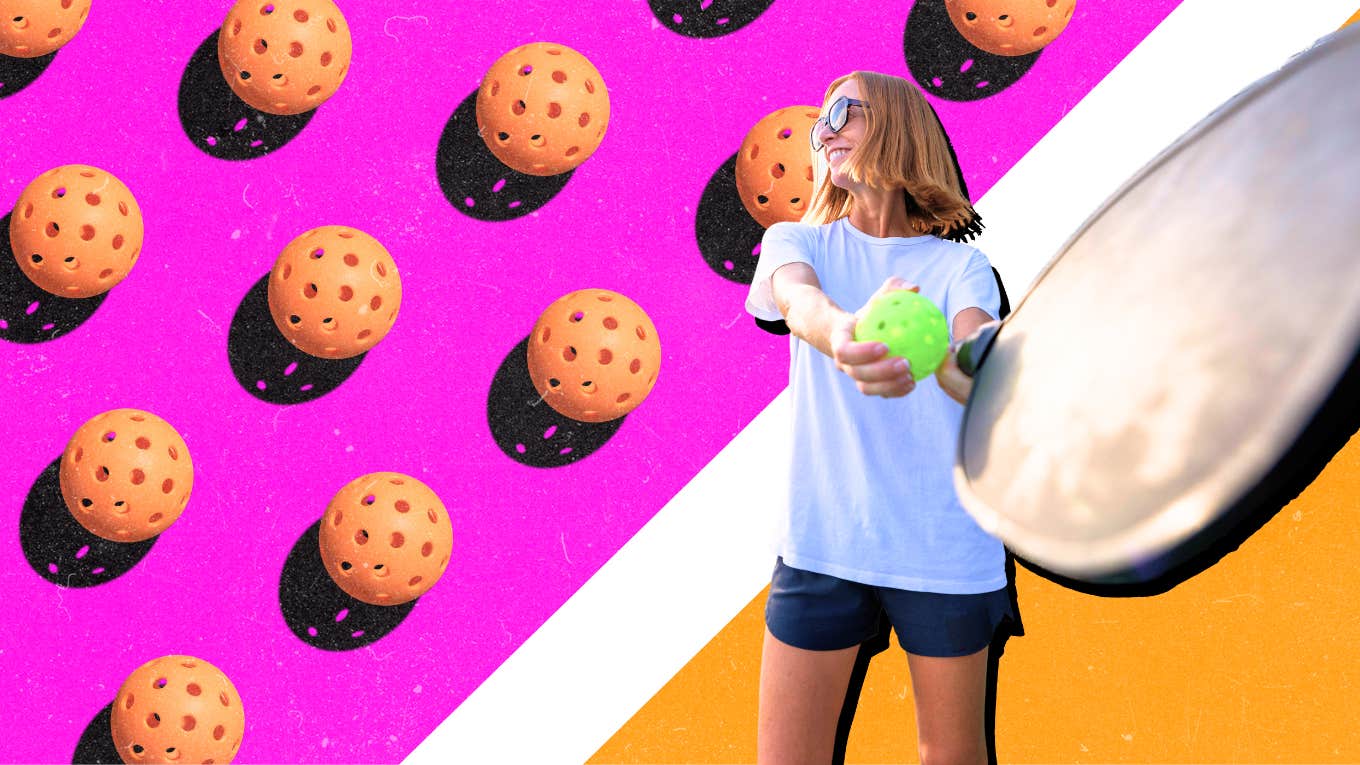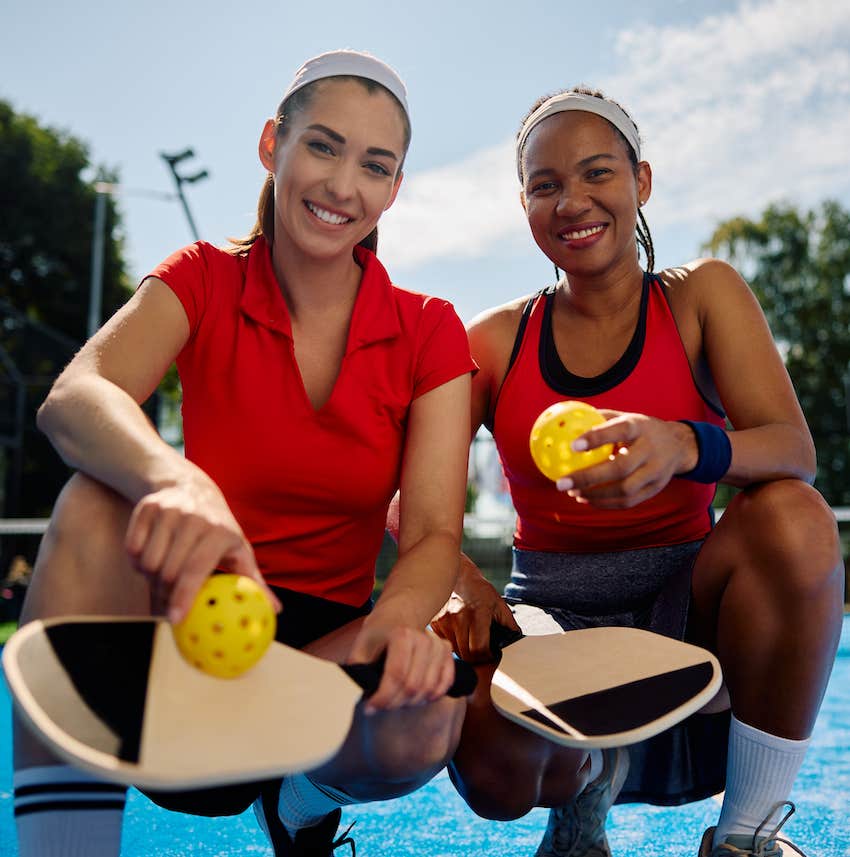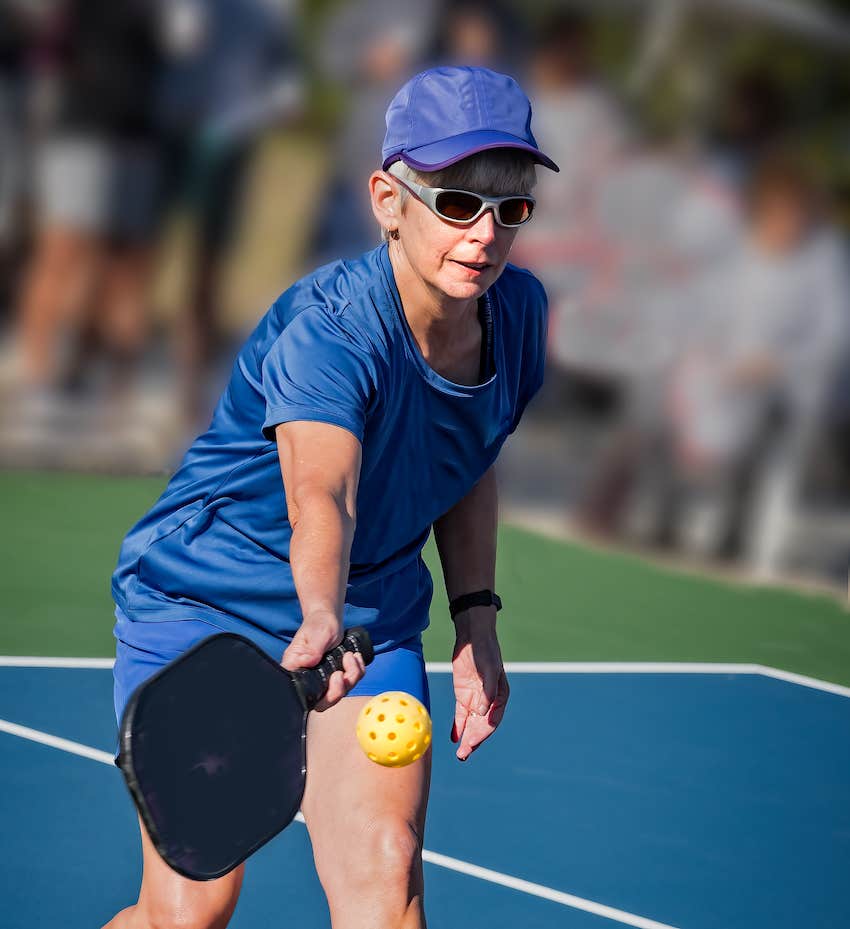10 Tiny Happiness Lessons I Learned Playing Pickleball
I didn't realize how much I was missing in my life until I picked up that paddle.
 LPETTET, Bill Oxford | Canva
LPETTET, Bill Oxford | Canva A few years ago, I found I was without workout buddies. Early in 2020, my running buddy had a career-ending injury so I rarely saw her, and my yoga teacher stopped teaching classes due to lockdown, so I didn’t see her or my yoga buddies. All were people I shared little snippets of life with, some over the years. As I emerged from isolation, they were all out of my life and it felt like a little piece of my happiness was gone.
Then, an announcement for a beginner’s pickleball class appeared in my email. I wondered if it was an opportunity to replace those casual social connections that had subtly contributed to my happiness and well-being. The conversations we have with people we share activities with don’t seem like much until they’re gone. This is especially true if, like me, you work from home.
It’s easy to see why pickleball is the fastest-growing sport in the country. Because there’s a very shallow learning curve, you’re quickly playing with some ease. Because it’s everywhere, it’s easy to find courts and people at your level. The more I play, the more I realize how much the sport contributes to my happiness and well-being, and I can see it’s the same for the people I play with. As several fellow picklers have remarked, it’s addictive. But in a good way.
Here are 10 tiny happiness lessons I learned playing pickleball
1. Being outdoors is uplifting
There are indoor pickleball courts, but most people prefer playing outdoors. The value of spending time outside is well established, including its contribution to decreased stress and improved sleep, creativity, and health.
I usually play in an urban spot, but there are still birds, the sky, and the feel of the sun or wind on my face. Instead of spending those hours sitting at my desk, I’m outside. It’s very uplifting.
 Drazen Zigic via Shutterstock
Drazen Zigic via Shutterstock
2. Exercise and cognitive challenges are good for your mood
Pickleball is not physically demanding, but my watch tells me I burn calories, earn steps, and raise my heart rate, so there are obvious benefits. It’s good to warm up a little beforehand and stretch a little after, so overall, you’re getting in a decent workout.
There’s some cognitive exercise as well. Just read how the scoring works and you’ll probably respond like most of us…What??? You must learn it and pay attention to applying it (with varying degrees of success) which is probably as beneficial as doing Sudoku, in my humble opinion. It also makes for a lot of comic relief when no one can remember the score, everyone remembers a different score and you all realize it doesn’t matter. It is, after all, for fun.
3. Pickleball is an opportunity to connect, which we need for happiness
You will find people of all ages and walks of life which is delightful. To be honest, there is occasional drama. As in any human community, there are the sticklers for the rules, aggressive bangers, over-apologizers, and forever butthurt. But most importantly, I’ve met some fantastic people I’d never have met otherwise. You chat when you warm up and between games.
Maybe even during games if you’re playing with the we’re-not-taking-this-so-seriously group. My new buddies even got me a plant after the death of my cat. Those casual social connections I was sorely missing are back.
4. Working hard to improve at any sport is a natural 'high'
There is the slight discomfort of trying something you won’t be great at immediately. Did I say shallow learning curve? The game is indeed easy to learn with only minimal effort. Getting better takes work.
When you see yourself improving it’s a little bit of a high, a little bit of a stretch. It’s the kind of stretching that’s good for enhancing well-being. Having a new challenge in your life contributes to happiness, particularly, ahem, as you age.
5. Setting goals builds confidence
You may set the simple goal of learning to play. Or the goal of playing three times a week, i.e., getting exercise three times a week. You might decide to play in a league or take lessons.
I love a good challenge, so I go to drills and play in tournaments, something I’ve never done before. You might set a goal of playing tournaments in every state, the way people do with marathons (special bonus: you don’t have to run 13.1 miles). Succeeding at challenges makes us more confident.
6. Playing doubles teaches patience with others
This goes for patience with yourself and others. Patience with yourself because it takes time to improve and you will make mistakes. Frequently. You’ll probably play doubles, which is a joy since it cuts down the pounding on your feet and it’s fun to share the wins and losses.
This also means patience with your partner who may be having a bad day, pickleball-wise or otherwise, or having a great day when you’ve gotten up on the wrong side of the bed. But you see, that’s also the joy. Your partner raises your mood and your game, and vice versa.
7. You don't have to be rich to have fun
You don’t have to invest much to give it a try. You can buy a paddle on the cheap ($20 for my first paddle, bag, and four balls) and you don’t need special clothing.
It’s an opportunity to buy new clothes if that’s your jam, but any athletic gear will do and you’ll see people in everything from fashionista gear to old gym shorts and t-shirts. You do need court shoes, which you probably have in the back of your closet like me. If you don’t like the game, it’s not much of a loss.
8. You can have fun playing sports even if you're older
Compare pickleball with tennis. The paddle is a lot lighter than a tennis racket. It’s not as stressful on your shoulders, arms, and wrists. The ball is lighter. When you get hit with it there’s no damage. Okay, maybe an occasional bruise. You get to run, but not quite as far.
Compared to running, I think my knees will hold up better long-term since I swapped out a couple of days of running for pickleball. If you play smart—i.e., within your limits, meaning you back off if something hurts, you don’t go after shots like you’re 20 if you’re not, and you don’t go from not exercising at all to overdoing it—you probably won’t get injured.
9. Complimenting others and practicing gratitude grounds you in happiness
People like it when you tell them how well they’re playing or how much they’ve improved. It feels good to receive and give praise. I try to thank people for playing with me, especially when they’re more skilled. These small gestures turn out to be happiness hacks.
 Jo Crebbin via Shutterstock
Jo Crebbin via Shutterstock
10. Pickleball forces you to unplug, which is great for your mood
People aren’t looking at their phones on the court and rarely walk off to take a call. I’m just playing or relaxing between games. I don’t check my messages, email, social media, or the news until I’m finished. It’s liberating to be free of it all and a surefire stress reducer.
Responding to that email by taking my first class and deciding to keep going has been life-changing in all these ways. Replacing the missing social connections has been paramount for me. Maybe for you, regular exercise or an opportunity to unplug would be the best part. It’s all about getting together to do something fun and challenging, but not too challenging (think flow), outdoors. Just thinking about it makes me smile and realize I can’t wait to get out there tomorrow.
Judith Tutin, Ph.D., ACC, is a licensed psychologist and certified life coach. She shares more work in her book, The Post-Divorce Survival Guide.

